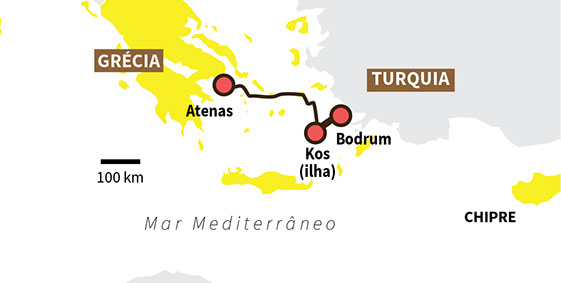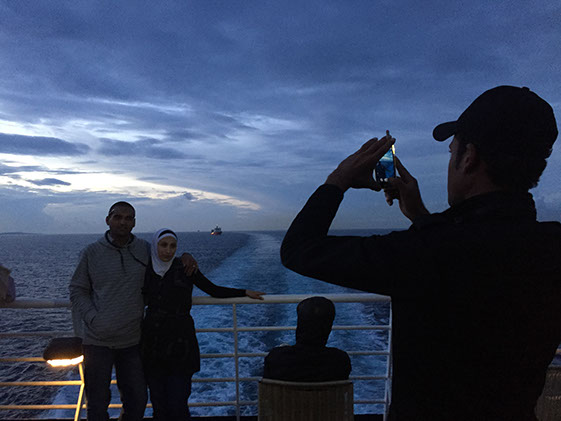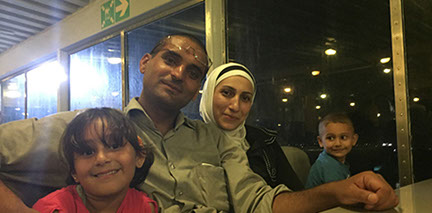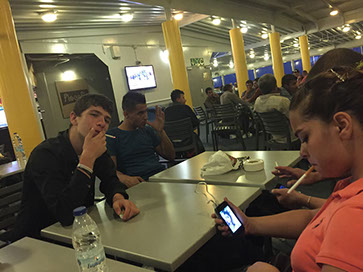Sleepless in the sea
The story of an uncle decapitated for smoking during Ramadan, photographs and card games during a night-long trip on a boat.

Sunset colors the sky with thin orange strokes as Ghazi's family and their friends head to the harbor in Kos. It is late afternoon on Monday, September 20th. They carry their backpacks and walk to the ship that is about to take them to Athens. Finally, a real ship with several decks and blinking lights. On the way to the port, carrying a blue Spiderman backpack that he got from volunteers, Mohammad spreads his arms like a tiny airplane. He piggybacks Mohamed Ali, 23, a marathon runner and boxing fighter, the only Iraqi in the group. Tala, 5, is on the shoulders of her inseparable friend Musa, carrying a pink Princess Elsa backpack, also a gift.
Together, the four of them sing songs and make hearts with their hands, while the father checks the documents of all the 11 members of the group. Before entering the port, they take farewell pictures posing in front of the beach, the symbol of their first victory. Boats and tents are left behind. It is time to move on.
Ghazi, Razan, Tala e Mohammad no navio rumo a Atenas
I follow them and show my ticket, but the agents who are checking the documents tell me that I must go to a different line. The refugees will stay, separated by a fence, while the other passengers will have priority for boarding.
“Come with us, come with us!” Mohammad and Tala insist, reaching my hands through the squares of the grid.
“Why put them behind a fence? That's disgusting,” remarks an Italian tourist with his girlfriend, watching as the refugees crowd the area set aside for them.
In the ship, however, there are no restrictions. Traveling economy class, most of the refugees stay in the upper room. There are no beds in here, but rather tables, chairs and balconies to enjoy the view. Ghazi and his wife grab one of the much sought-after cushioned benches by the window to accommodate their kids. As soon as Mohammad sits down, the little boy sticks his hands on the glass and gazes at the vastness of the sea.
Looking through the windows, we can see Bodrum's cityscape in the distance. The same sea that once filled them with dread is now their route to freedom.
As soon as the ship moves away from the coast, the group starts playing cards. The smoke fills up the air. They all smoke non-stop, something that would not go unpunished in the Syrian towns controlled by ISIS. One of the members of the group, Abd Airhman, 18, says that his uncle had his head cut off by ISIS members. His crime was smoking during Ramadan, the month for fasting and praying in the Muslim calendar.
“My uncle wasn't religious, so they arrested him. They first cut off his fingers, and then his head,” he relates.

No convés do navio que leva o grupo a Atenas, Ghazi e Razan são fotografados no celular por um amigo
As the card game goes on, residents of Raqqa tell what it is like to live in the capital of the Caliphate. If people who are caught smoking in public can have their fingers cut off, those who dare to wear jeans or tight clothes run the risk of having their legs mutilated with machete blows. Men are not allowed to shave, women must cover their bodies. Schools have been closed down because ISIS did not approve the teaching of scientific disciplines. No biology or evolution theory, no history, no philosophy, sports or arts. The curriculum has been remade from scratch to ensure priority to Muslim studies. Images of severed heads and executions are widely propagandized as an intimidation strategy against citizens that disobey their rulings. In a daily routine of constant fear, the population also must be on the lookout for attacks by other warring factions.
“Both the government and ISIS are killing Syrians. We were in the middle of them,” says Ghazi as he writes down the score of the game played by the younger ones.
The game doesn’t stop as the conversation continues: this is old hat for the group. They insist on making it clear that none of this has anything to do with religion.
“ISIS is not muslim. Muslims like people, they don't like killers. We are muslims, are you afraid of us?” Ghazi asks, as he offers me a cup of coffee.


